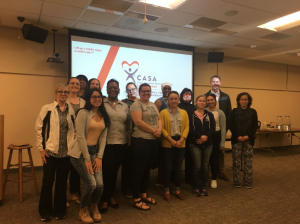Get Involved

 Become a Thought Partner
Become a Thought Partner
Partner with us to produce thought leadership that moves the needle on behavioral healthcare.
 Other options to get involved
Other options to get involved

Thank you!
We received your information and will be in contact soon!
Get Involved

 Grantmaking
Grantmaking
We fund organizations and projects which disrupt our current behavioral health space and create impact at the individual, organizational, and societal levels.
 Participatory Funds
Participatory Funds
Our participatory funds alter traditional grantmaking by shifting power
to impacted communities to direct resources and make funding decisions.
 Special Grant Programs
Special Grant Programs
We build public and private partnerships to administer grant dollars toward targeted programs.
 Program Related Investments
Program Related Investments
We provide funds at below-market interest rates that can be particularly useful to start, grow, or sustain a program, or when results cannot be achieved with grant dollars alone.
Get Involved

 Alyson Ferguson, MPH
Alyson Ferguson, MPH
Chief Operating Officer
Contact Alyson about grantmaking, program related investments, and the paper series.
 Samantha Matlin, PhD
Samantha Matlin, PhD
Senior Learning & Community Impact Consultant
Contact Samantha about program planning and evaluation consulting services.
 Caitlin O'Brien, MPH
Caitlin O'Brien, MPH
Director of Learning & Community Impact
Contact Caitlin about the Community Fund for Immigrant Wellness, the Annual Innovation Award, and trauma-informed programming.
 Joe Pyle, MA
Joe Pyle, MA
President
Contact Joe about partnership opportunities, thought leadership, and the Foundation’s property.
 Bridget Talone, MFA
Bridget Talone, MFA
Grants Manager for Learning and Community Impact
Add some text here
April is National Child Abuse Prevention Month, and our attention rightly turns to ways we can support children who have experienced abuse or neglect. According to the US Children’s Bureau, in 2018 there were 687,000 children in foster care in the United States due to abuse or neglect. More than 5,000 of those children live right here in Philadelphia.
For children to thrive despite abuse or neglect, resilience is key. The most common factor in developing resilience, according to the Harvard Center on the Developing Child, is having a stable relationship with a supportive adult.
That’s where Court Appointed Advocates of Philadelphia County (CASA) comes in. We recruit, train and support volunteers who get to know children and the adults around them, and who advocate for those children’s needs in court and in the community. Our volunteers are simply everyday people who care deeply about children and are ready to make a child’s life better. They are part of a national network of 93,300 volunteers who are doing this work.
 Many of the children we serve are not used to having adults in their lives who they can trust. Most children who experience abuse or neglect are victimized by their own parents. Parental drug abuse, for example, was involved in more than one third of cases of children being removed from families for maltreatment in 2018, nationwide.
Many of the children we serve are not used to having adults in their lives who they can trust. Most children who experience abuse or neglect are victimized by their own parents. Parental drug abuse, for example, was involved in more than one third of cases of children being removed from families for maltreatment in 2018, nationwide.
Children who have been living in these situations can become accustomed to being overlooked. In fact, most children removed from their families for maltreatment have suffered from neglect as opposed to active abuse.
Researchers at the Harvard Center on the Developing Child have pointed out that despite this, child neglect receives far less attention than abuse. Compared to active abuse, chronic neglect has been found to be associated with a larger range of damage to children.
By advocating for children’s needs, community members can make a major impact when it comes to mitigating this kind of damage.
Older youth are some of the youth most in need of advocates. Although babies are at the highest risk of being maltreated, nearly 20 percent of children in foster care nationally are age 15 or older.
Having experienced abuse or neglect has lasting consequences for these youth.
The US Children’s Bureau has found that at age 17, more than one quarter of youth in foster care have been referred for substance abuse treatment or counseling at some point. By age 21, 20 percent of youth who were in foster care at age 17 have been incarcerated within the prior two years. Twenty-two percent of former foster youth, by age 21, have given birth to or fathered a child. Forty-two percent have experienced homelessness at some point.
We have great hope for these youth despite the long odds against them. At age 17, 94 percent of youth in foster care reported that they had a supportive adult in their lives who they could rely on for advice or emotional support. Having a stable relationship with a supportive adult can help children do well even when they have faced significant hardships.
For a great number of these youth, CASA volunteers are that supportive adult. Our programs serve approximately one-third of older youth in foster care nationwide. Our volunteers are trained to understand the impact of trauma on children. They advocate for services that promote healing and help children build resilience. The work CASA volunteers do is life-changing, and sometimes life-saving.
Removing children from an environment in which they experienced abuse or neglect does not guarantee positive outcomes for those children. They need quality, therapeutic care and support to move beyond those experiences and thrive.
The impact of the current COVID-19 crisis on our foster care system will likely be unprecedented. Court delays due to closure, the ramifications of delayed abuse reports, and the economic and emotional toll of prolonged social distancing all point to a sharp rise in the need for additional support for the especially vulnerable population CASA works with every day.
To get that care and support, children need an adult who can advocate for them and who they can lean on over time. Now is the time for each of us to become that adult, by becoming a CASA volunteer or supporting our programs so others can.
Always remember CASA encourages #eyesonkids during COVID-19 and everyday!
_____________________________________________________
Happi has 25 years of social work experience in both the public and private sectors. She earned a Masters of Social Work degree from Temple University and is a graduate of the Bryn Mawr College Non-Profit Executive Leadership Institute. Over her 20-year tenure of serving the greater Philadelphia community, Happi has worked in a variety of settings with programs serving youth from early childhood to adolescence. Happi began her postgraduate career at Youth Service, Inc. (YSI) working with young women in group home placements. She moved on to be a supervisor and then program director at YSI, overseeing the foster care and mother baby group home programs. She later oversaw the crisis nursery, Teen Success, and truancy prevention programs. From 2014-2016, Happi worked at Northeast Treatment Centers as Intervention Director with the Community Umbrella Agency (CUA 1). Happi joined CASA of Philadelphia in September 2016.
CASA Philadelphia and the Scattergood Foundation share co-working space at Friends Center in Philadelphia.










